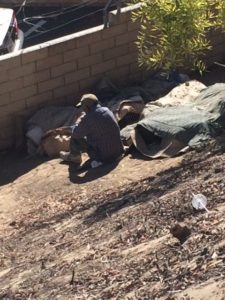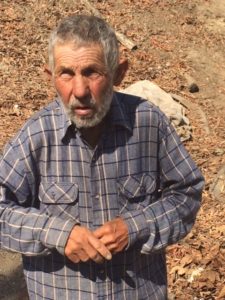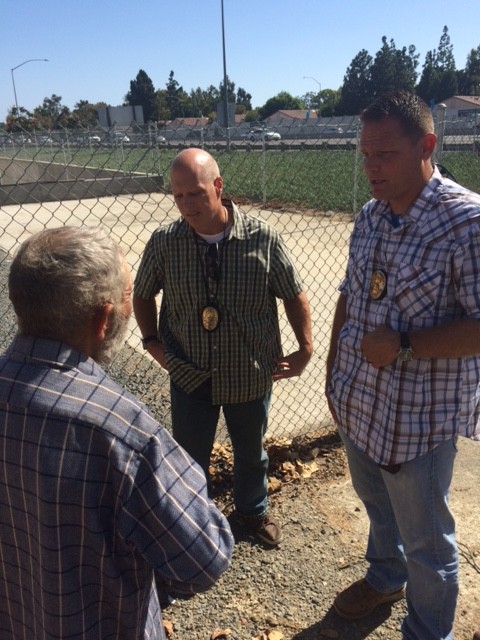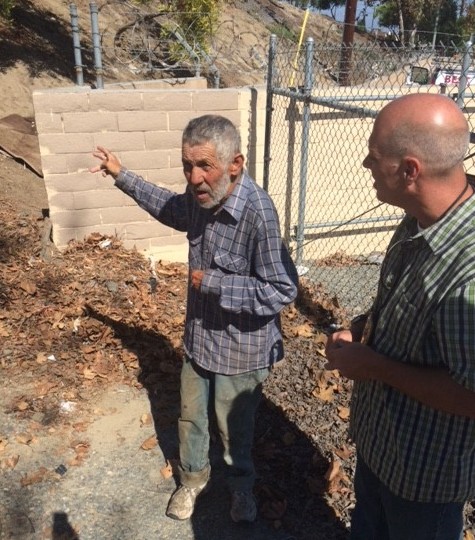For 17 years, Richard was an invisible neighbor.
Nestled at the bottom of an embankment on Edinger Avenue near Beach Boulevard, his home was a small collection of belongings and dirt-caked blankets.
In June, work crews ripped out the bushes and most of the trees on the steep slope that backs up to an apartment complex.
Richard became exposed.
The police were called as complaints trickled in about the homeless man on the hill. 
Richard’s home now is threatened, but Huntington Beach police say that may be a good thing.
The apartment complex owners “want me to kick him out,” said Huntington Beach officer Scott Marsh. “Once I found out he’s been living there that long, I said I’m not going to do that.”
Marsh and other officers on the department’s Directed Enforcement Team instead decided to help the 62-year-old Army veteran they believe suffers from mental illness.
“This is much more complex than a homeless person just deciding to take up residence in some public area,” said officer Rich Eidlhuber. “There are a lot of deep-rooted issues.”
The Huntington Beach PD’s Directed Enforcement Team works on a variety of cases including nuisance properties, hoarders and the homeless.
Marsh and Eidlhuber said their propensity for helping others is what draws them to cases like Richard’s.
“He’s been in that spot for 17 years,” Eidlhuber said. “For us to post a notice and tell him he only has three days … to get out, it’s not humane.”
A ‘GENTLE SOUL’
It’s nearly impossible to dislike Richard.
“He’s such a gentle soul,” Marsh said. “He’s just very kind.”
Childlike and meek, Richard is small with sun-weathered skin.
He speaks with a slight drawl, a byproduct of growing up in Texas, and pulls at his fingers when nervous.
He wears a blue flannel shirt two sizes too big, and paint-speckled jeans. 
Richard’s New Balance sneakers are well-worn from walking to downtown Huntington Beach to scavenge for recyclables every morning.
Sometimes he makes as much as $44 from his collected bottles and cans, but other days he doesn’t break $1.
Marsh said they visit Richard weekly and, with each visit, are piecing together his story.
Richard enlisted in the Army in the early 1970s, after the Vietnam War ended.
“There was no more fighting, so I thought it would be like the Boy Scouts,” he said. “I got there and everybody was mean to me, so I had to go AWOL.”
Richard said he went AWOL twice.
One of those times, he was treated at a mental hospital at the Presidio in San Francisco.
He eventually made his way back to Denton, Texas, where he grew up.
Richard didn’t stay.
He next went to Nevada where he worked at a recycling center outside of Las Vegas.
After that, he ventured to California.
Marsh said it still is unclear how, or why, Richard made his way to Huntington Beach.
“We don’t push too much on the details,” Marsh said. “We have to gain his trust, and then he just starts to open up.”
Richard said he just came across the Edinger Avenue spot one day, and decided to stay.
The hidden embankment was more welcoming a place than the concrete freeway bridge at Beach and Garden Grove boulevards he’d been living under.
“Well, I just like it here,” he said.
Although fond of his home, Richard also told the officers he’s open to leaving it.
A LONG PROCESS
Marsh has been trying to get Richard off his daily diet of granola bars and three Natural Ice beers for weeks now.
The officer helped Richard obtain a Golden State Advantage card, which allows Richard to purchase about $50 a week in food from certain grocery stores and fast-food restaurants.
Although Richard doesn’t plan to give up his granola bars and beer, he tells the officers he will add cottage cheese and chocolate donuts to his short grocery list.
Marsh and Eidlhuber also are working with advocates from Orange County Mental Health to get Richard an identification card so he can claim VA benefits and one day find a permanent home.
“We just want to get him out of the dirt, but we know that can take quite a while,” Eidlhuber said. 
Not only do the officers have to go through a lengthy bureaucratic process to find help, Richard has to be willing to accept it.
“In the end, it might be a huge disappointment,” Marsh said. “It could become very frustrating because he might not be up for any of it.”
“But at least we can say that we tried,” Eidlhuber added.
 Behind the Badge
Behind the Badge



